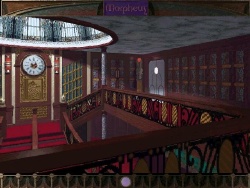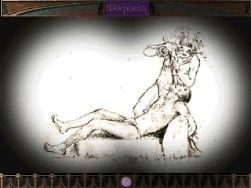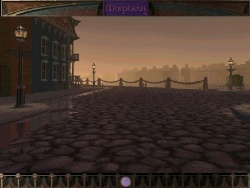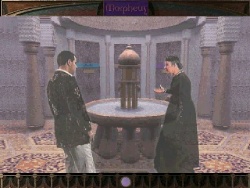|
Morpheus (Second Opinion)
 The
challenge of recreating someone else's dreams so that you actually feel - so that you truly believe
that you're inside that person's head - is certainly a daunting one. For nearly as long as graphic
adventures themselves have existed, there has been the almost obligatory dream sequence. In most
games, however, these sequences consist of non-interactive cut scenes used merely as eye candy.
But how about interactive dreams? Ones where you have to put yourself in the dreamer's shoes and
think like they would in order to return to the waking world? The alternative is to dream that
same dream, over and over... forever. The
challenge of recreating someone else's dreams so that you actually feel - so that you truly believe
that you're inside that person's head - is certainly a daunting one. For nearly as long as graphic
adventures themselves have existed, there has been the almost obligatory dream sequence. In most
games, however, these sequences consist of non-interactive cut scenes used merely as eye candy.
But how about interactive dreams? Ones where you have to put yourself in the dreamer's shoes and
think like they would in order to return to the waking world? The alternative is to dream that
same dream, over and over... forever.
You... and your long lost father - one Theodore "Teddy" Holmes, an intrepid arctic explorer who,
against all odds, crossed paths with a dying man who was babbling on about some mysterious luxury
ship gone far off course on its maiden voyage. All that you ever knew about your father came by
way of a cryptic telegram delivered to your grieving mother almost three decades ago. It mentioned
the name of this ship, Herculania, and little else. Apparently, your father had left the remainder
of the expedition members behind to seek out this ship alone. And now, some thirty years later, you
find yourself following in your father's footsteps in an attempt to discover what happened to him
all those years ago. But it all goes wrong when you become lost in a blizzard, hopelessly separated
from the rest of your party. And then, in the distance, you spot the outline of something very large,
mired in the ice. This can only be a dream - one last trick played upon the imagination of a man about
to perish from exposure...
As you'll soon discover, the guests and crew of the Herculania are not large in number. They share
a common bond... and a peculiar fate. The ship, seemingly decades ahead of its time with the advanced
and wonderous technology it carries, harbours a dark secret which only you can uncover. And you'll be
left wishing you hadn't.
 On to more earthly matters. The engine used in Morpheus is quite similar to that used in
Zork Nemesis, though obviously more up-to-date and a little
fancier. You can pan around a full 360 degrees, but can only move to certain nodes. My machine is well
above the minimum speed required to run this game, so I could pretty much turn in real time. As you
turn, the cursor will change from neutral into an arrow when you hit upon a direction that you're allowed
to move in. When you are able to take a closer look at an object, the cursor automatically turns into a
magnifying glass. No extra clicking required, a nice simple interface - though, it still has you scanning
the screen for hot spots every time you enter a new locale. But there are no miniscule spots to find, so
Morpheus could never be accused of making you 'pixel hunt'.
On to more earthly matters. The engine used in Morpheus is quite similar to that used in
Zork Nemesis, though obviously more up-to-date and a little
fancier. You can pan around a full 360 degrees, but can only move to certain nodes. My machine is well
above the minimum speed required to run this game, so I could pretty much turn in real time. As you
turn, the cursor will change from neutral into an arrow when you hit upon a direction that you're allowed
to move in. When you are able to take a closer look at an object, the cursor automatically turns into a
magnifying glass. No extra clicking required, a nice simple interface - though, it still has you scanning
the screen for hot spots every time you enter a new locale. But there are no miniscule spots to find, so
Morpheus could never be accused of making you 'pixel hunt'.
You have the option of transitioning smoothly to all new locations via QuickTime, and I left this
feature turned on as the effect was rather nice. But you can turn it off to move around more quickly.
Those with little patience might find this necessary, as there are no short cuts to locations you have
previously visited.
Events of the past are also played back to you via QuickTime movies which are superimposed on the
background. These are a little bit grainy, but I believe that is the intended effect. You trigger these
movies when you walk into certain areas or examine special objects, and for the most part, you can
easily re-trigger them repeatedly in case you missed something on the first viewing. Some of them contain
vital clues for progressing the game. The standard of acting is quite good - it certainly never ruined the
feeling of being immersed in this game - whereas bad acting hauls you back into reality like a slap in the
face.
Each locale or... entity (yes, that's the word!) in Morpheus has it's own unique accompanying music.
Haunting melodies for the most part, of course. They add immensely to the atmosphere. Sound effects are as
you might expect for a modern adventure. Superb.
 I hope you were paying attention in algebra class. One particular mathematical puzzle in Morpheus had
me scratching my head for hours. I knew all the information needed was there right in front of me, but I just
couldn't put all the pieces together. Finally, when the solution came to me, I was absolutely delighted with
the fruits of my endeavours. I was shouting "Yes, YES, YESSS!!!". It's been years since solving a puzzle gave
me such a feeling of accomplishment. You'll be delighted to know that although Morpheus stretches your
mind a bit on the numerical front - that refreshingly, for once, there are: no mazes, no slider puzzles, no
sound puzzles(!), and no timed sequences.
I hope you were paying attention in algebra class. One particular mathematical puzzle in Morpheus had
me scratching my head for hours. I knew all the information needed was there right in front of me, but I just
couldn't put all the pieces together. Finally, when the solution came to me, I was absolutely delighted with
the fruits of my endeavours. I was shouting "Yes, YES, YESSS!!!". It's been years since solving a puzzle gave
me such a feeling of accomplishment. You'll be delighted to know that although Morpheus stretches your
mind a bit on the numerical front - that refreshingly, for once, there are: no mazes, no slider puzzles, no
sound puzzles(!), and no timed sequences.
As with all adventure games, not every puzzle is a winner. Morpheus too has it's share of clunkers.
Even some of the dream sequences are much better than others by a long shot. But the good puzzles are really
good, and even the 'bad' ones aren't so bad. Without giving too much away... half the time you're trying to
climb inside a person's head to figure out what to do next. You spend the other half trying to climb back out
of their head to escape the nightmares!
Morpheus is a bit slow to start with, so you have to give it some time to pick up the tempo. The first few
puzzles are quite easy, but then, when you finally figure out roughly what you have to accomplish, you'll find
yourself saying "Wow, this is really hotting up!" Be prepared to take a lot of notes. The clues are all there...
but not necessarily where you expect them to be.
 Until now, I've done nothing but gush about this game. Of course, there has to be a downside, a reason why I
can't recommend a Gold Award. Actually, there are three reasons:
Until now, I've done nothing but gush about this game. Of course, there has to be a downside, a reason why I
can't recommend a Gold Award. Actually, there are three reasons:
- Alas, still no people to interact with in this game. When some lucky company finally manages to produce a
game of Morpheus' calibre that also has people who talk to you, and more importantly, who you can talk
back to...
- At a point near the end, when you think there's still a lot of game left, you quite suddenly find yourself
watching the closing credits.
- A few technical problems, one of which nearly caused me to give up before I even started playing! First off,
you have to manually set your screen resolution to 640x480, and your colour depth to High Colour (16-bit) before
you play. I would have thought these settings could be re-programmed on the fly. Then, Morpheus can't
remember where you put your saved games, so each time you start up, you have to manually point it at the folder
you selected when you saved the very first game. Also, each time you start up Morpheus, you must have CD 1
(of 3) in the drive. And finally... I can't believe no one else has ever seen this, and I still got no answer
back to my carefully crafted email directed at Piranha tech support. Like I said, it nearly caused me to give up
before I even started... after completely re-installing Windows 95 twice (I know. Cheap entertainment, right?), I
finally twigged what the problem was: the Windows default is white backgrounds for all the windows, but this
setting causes me to go 'snowblind' (I'm making this tremendous sacrifice right at the moment just to bring you
this review). So, first thing I do is set my windows backgrounds to light grey... and Morpheus uses that
as its background?! So everyhting looked washed out. A little too dependent on Windows for comfort, guys. Just
to confirm this was the problem, I set my Windows colour to red. Wahey! Morpheus through rose-tinted glasses.
*Sigh* But in the end, I forgive them, for the gaming experience Morpheus provided was well worth the initial
hassle of getting it to run.
Copyright © Steve Metzler 1998.
All rights reserved.
System Requirements:
Windows: Pentium, 16MB RAM, Quad speed CD-ROM drive, 640x480 display (256 color or higher) Windows 95, Windows
compatible sound card and mouse.
Macintosh: PowerMac, 16MB RAM, Quad speed CD-ROM drive, 640x480 display (256 color or higher) System 7.5 or above.
The CDs for this game are hybrid CDs. They will work for either Macintosh or Windows 95 computers.
|

